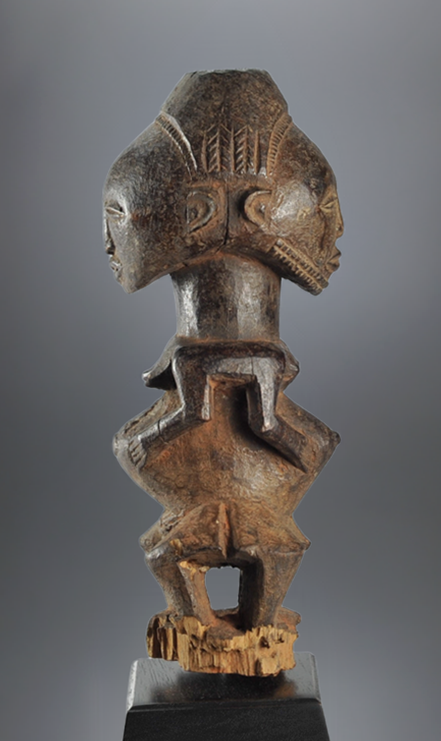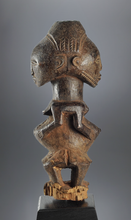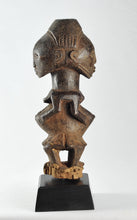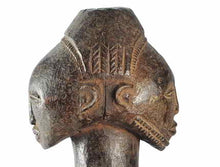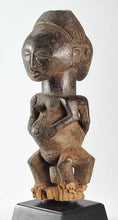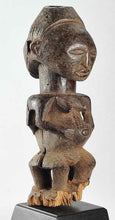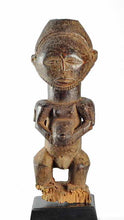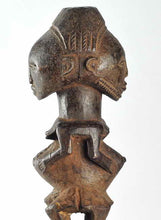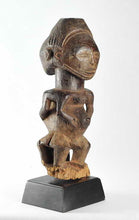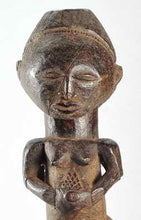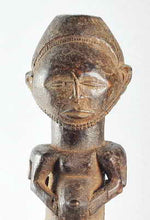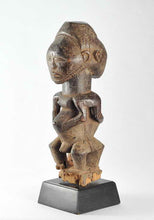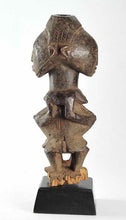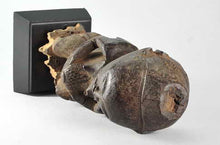MC1295 Superb Kabeja HEMBA Sculpture Janiforme Janus figure
Regular price
€2,500.00
Sale
English description below
KABEJA HEMBA
Superb statue with a beautiful crusty patina
The Hemba had very talented sculptors and the tribe's art is mainly known for the effigies of ancestors, the Singiti, figures of power who exude an astonishing serenity and natural authority.
According to François Neyt in "La grande statuaire Hemba", the Kabeja (or Kabedja) are Janiform sculptures that represent the founding ancestor couple of each clan, the statue was unique and belonged to the chief, while each group had several Singiti. It played a role in all ceremonies, as well as in court decisions.
According to Jean-Baptiste Bacquard, the Kabeja represent spirits
that would protect the clan. The cavity at the top of the skull contained magical substances
The Hemba people live in eastern Congo DRC, between the Lualaba River (Congo River) in the west and Lake Tanganyika in the east.
Their territory is structured around the Luika River which delimits the Hemba of the north and those of the south. They are therefore present in the south of the province of Maniema as well as in the north of the province of Tanganyika
They are geographically and culturally close to the Luba
Their territory is structured around the Luika River which delimits the Hemba of the north and those of the south. They are therefore present in the south of the province of Maniema as well as in the north of the province of Tanganyika
They are geographically and culturally close to the Luba
Features:
TYPE OF OBJECT: Statue.
ETHNIC GROUP: Hemba Bahemba.
COUNTRY OF ORIGIN: Democratic Republic of Congo DRC
(ex Belgian Congo, ex Zaire).
MATERIAL: Wood.
DIMENSIONS: Height 30.5 cm.
35 cm with base
CONDITION: Average - Poor
(See photos).
--------------------------
Find us on social networks:
Find us on social networks:
Subscribe to our mailing list
--------------------------
--------------------------
Bibliography / Bibliography:
- The great Hemba statuary of Zaire, François Neyt, Higher Institute of Archaeology and Art History, UCL, Louvain-La-Neuve, 1977
- The Tribal Arts of Africa, Jean-Baptiste Bacquart, Thames and Hudson, 1998
- 100 peoples of Zaire and their sculpture. The handbook for collectors, scholars and students, Marc Leo Felix, Brussels: Zaire Basin Art History Research Foundation, 1987 page 35 illustration 5
- KABEJA - Bernard de Grunne - 2012
----------------------------
CONGO DRC
KABEJA HEMBA
Superb statue with a beautiful crusty patina
The Hemba had very talented sculptors and the art of the tribe is mainly known for the ancestors figures, the Singiti, symbols of power who exude astonishing serenity and natural authority
According to François Neyt in "la grande statuaire Hemba", the Kabeja is a rare Janiform sculpture which represents the couple of founding ancestors of each clan. The statue was unique and owned by the chief, while each group had several Singiti figures. It was used in all Hemba ceremonies, as well as in court decisions
Jean-Baptiste Bacquard suggests that the Kabeja would represent spirits. And protect the clan. The cavity at the top of the head contained magic substances
The Hemba live in eastern Congo DRC, between the Lualaba river (Congo river), to the west, and Lake Tanganyka, to the east
Their territory is articulated around the Luika river which delimits the Hemba of the north and those of the south. They are therefore present in the south of the province of Maniema as well as in the north of the province of Tanganyka.
They are geographically and culturally close to the Luba
Jean-Baptiste Bacquard suggests that the Kabeja would represent spirits. And protect the clan. The cavity at the top of the head contained magic substances
The Hemba live in eastern Congo DRC, between the Lualaba river (Congo river), to the west, and Lake Tanganyka, to the east
Their territory is articulated around the Luika river which delimits the Hemba of the north and those of the south. They are therefore present in the south of the province of Maniema as well as in the north of the province of Tanganyka.
They are geographically and culturally close to the Luba
Features:
TYPE OF OBJECT: statue, figure.
ETHNICAL GROUP: Hemba, Bahemba.
ORIGIN: Democratic Republic of Congo.DRC
(formerly Belgian Congo, formerly Zaire).
MATERIAL: Wood.
DIMENSIONS: About 12 inches high.
13 3/4" with the base
CONDITION: Medium - Bad
Please have a look on pictures
